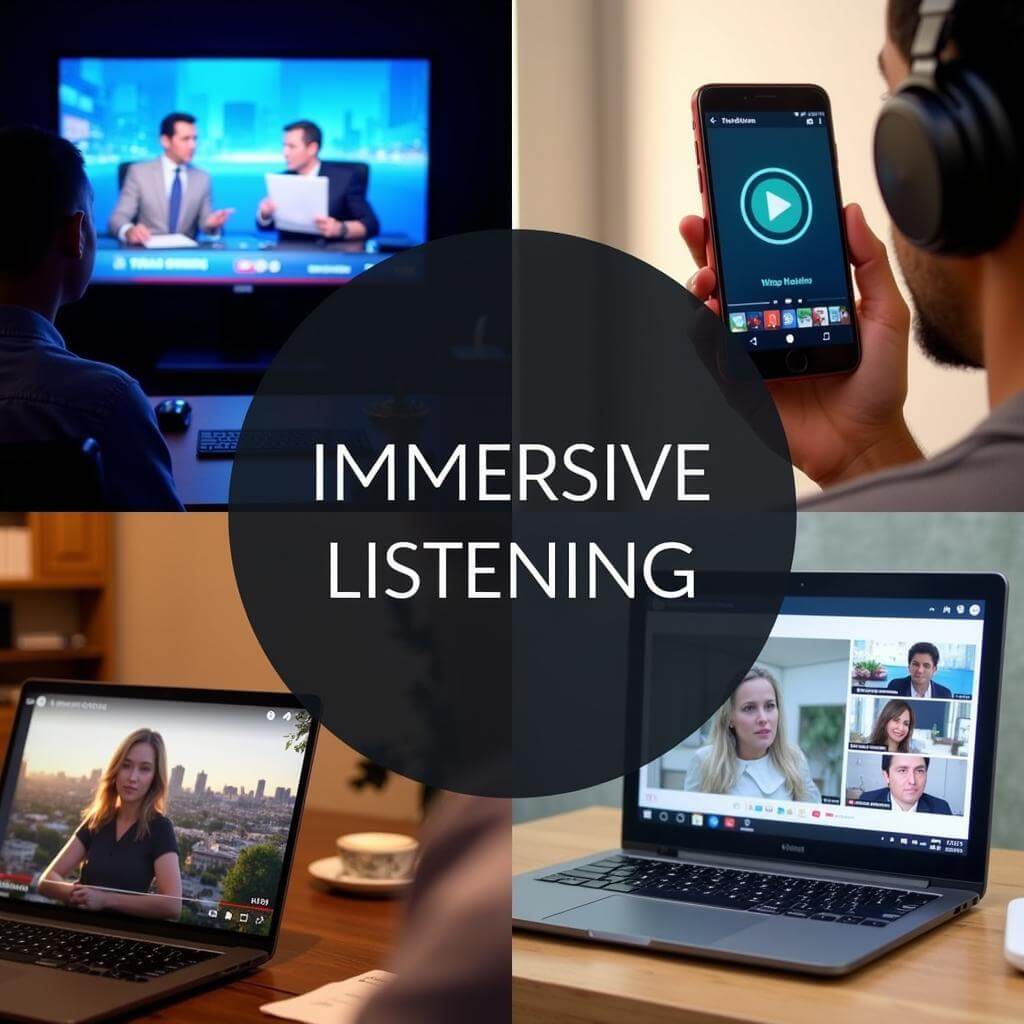Understanding the Importance of Listening Accuracy in IELTS
Listening accuracy is a crucial skill for IELTS test-takers, as it directly impacts your performance in the Listening section. This component of the test assesses your ability to understand spoken English in various contexts, from everyday conversations to academic lectures. Improving your listening accuracy naturally can significantly boost your overall IELTS score and enhance your English language proficiency.
Key Strategies for Enhancing Listening Accuracy
Immerse Yourself in English-language Media
One of the most effective ways to improve your listening accuracy is through constant exposure to English-language content. This method allows you to familiarize yourself with different accents, intonations, and speech patterns.
Examples of immersive listening activities:
- Watching English news broadcasts
- Listening to podcasts on various topics
- Enjoying English-language movies and TV series without subtitles
- Following YouTube channels dedicated to English learning
- Attending online webinars or lectures in English

Practice Active Listening Techniques
Active listening involves fully concentrating on the speaker and making a conscious effort to understand the message. This technique is particularly useful for the IELTS Listening test, where you need to capture specific details and main ideas quickly.
Key active listening strategies:
- Predicting content based on context clues
- Focusing on stressed words and intonation patterns
- Noting down key information while listening
- Identifying discourse markers and transition words
- Visualizing the information being presented
Expand Your Vocabulary
A robust vocabulary is essential for accurate listening comprehension. The more words you know, the easier it becomes to understand spoken English, especially in academic and professional contexts often featured in IELTS.
Effective vocabulary-building methods:
- Learning new words in context through reading
- Using vocabulary apps with spaced repetition
- Creating word association maps
- Studying word families and collocations
- Practicing with academic word lists specific to IELTS
Applying Listening Accuracy Skills to IELTS Test Scenarios
Tackling Different Question Types
The IELTS Listening test includes various question formats, each requiring specific listening skills. By improving your overall listening accuracy, you’ll be better equipped to handle these diverse question types.
Example question types and associated listening skills:
- Multiple choice: Identifying key information and distinguishing between similar options
- Matching: Recognizing relationships between ideas and concepts
- Form completion: Accurately capturing specific details like names, numbers, and dates
- Sentence completion: Understanding context and predicting appropriate words or phrases
- Short answer: Comprehending questions and providing concise, accurate responses
Dealing with Accent Variations
IELTS Listening tests feature speakers with various English accents, including British, American, Australian, and other native and non-native accents. Improving your listening accuracy naturally will help you adapt to these accent variations more easily.
Strategies for mastering accent recognition:
- Listening to international news sources
- Watching travel vlogs from different English-speaking countries
- Practicing with IELTS sample tests featuring diverse accents
- Engaging in conversations with English speakers from various backgrounds
- Using accent training apps or resources
Common Pitfalls in Listening Accuracy and How to Avoid Them
Overreliance on Written Text
Many IELTS candidates become too dependent on reading the questions and options, causing them to miss crucial audio information.
How to overcome this:
- Practice listening without looking at the questions first
- Develop the skill of simultaneous listening and reading
- Focus on understanding the overall context before diving into specifics
Difficulty with Numbers and Proper Nouns
Accurately capturing numbers, dates, and names can be challenging, especially when spoken quickly.
Improvement techniques:
- Practice number dictation exercises
- Learn common naming conventions in English-speaking countries
- Develop a personal shorthand system for quick note-taking
Misinterpreting Idiomatic Expressions
Native speakers often use idiomatic language, which can be confusing for non-native listeners.
Ways to improve:
- Study common idioms and their meanings
- Watch English-language comedy shows to understand humor and colloquialisms
- Practice inferring meaning from context when encountering unfamiliar phrases
Effective Training Methods for Natural Listening Accuracy Improvement
Shadowing Technique
Shadowing involves listening to native speakers and repeating what they say in real-time, mimicking their pronunciation and intonation.
How to practice shadowing:
- Choose a short audio clip (30 seconds to 1 minute)
- Listen to it several times to familiarize yourself with the content
- Play the audio and repeat the words simultaneously, focusing on matching the speaker’s rhythm and intonation
- Gradually increase the length and complexity of the audio clips
Transcription Exercises
Transcribing audio content can significantly enhance your listening accuracy and attention to detail.
Transcription practice steps:
- Select a short audio clip (1-2 minutes) from an IELTS-appropriate source
- Listen to the clip and write down everything you hear, including filler words and pauses
- Compare your transcription with the original script (if available) or relisten to check for accuracy
- Focus on areas where you missed information and practice those sections repeatedly
Dictogloss Activities
Dictogloss is a collaborative learning technique that combines listening, note-taking, and text reconstruction.
How to use dictogloss for IELTS preparation:
- Listen to a short passage twice at normal speed
- Take notes on key words and ideas during the second listening
- Work with a partner or small group to reconstruct the text as accurately as possible
- Compare your reconstruction with the original text and discuss any discrepancies
Conclusion
Improving listening accuracy naturally is a gradual process that requires consistent practice and exposure to diverse English-language content. By implementing these strategies and focusing on active listening techniques, you can significantly enhance your performance in the IELTS Listening test and improve your overall English language proficiency. Remember that progress may be slow at first, but with dedication and regular practice, you’ll notice substantial improvements in your listening skills. Keep challenging yourself with increasingly complex audio materials, and don’t hesitate to seek feedback from native speakers or English language professionals to refine your listening accuracy further.